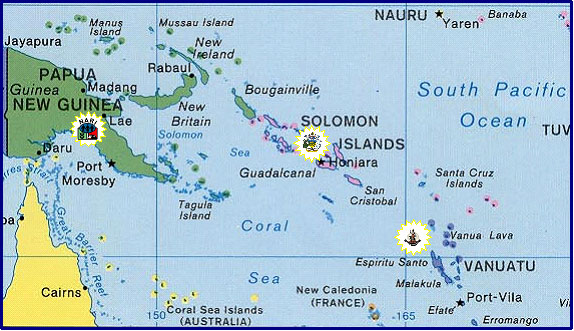Welcome to this new blog of the Western Pacific EUARD Project. This blog is intended for online collaboration, information sharing and networking among stakeholders of the action.
Below is a brief on the project:
Project Title – Generation and adaptation of improved agricultural technologies to mitigate climate-change imposed risks to food production within vulnerable smallholder farming communities in Western Pacific Countries
The project is funded by the European Union and implemented by the Papua New Guinea (PNG) National Agricultural Research Institute (NARI) in partnership with:
- The Ministry of Agriculture and Livestock (MAL), Solomon Islands (SI),
- Department of Agriculture and Rural Development (DARD), Vanuatu (Vu), and
- The University of Natural Resources and Applied Life Sciences (BOKU) in Vienna, Austria.
This is a five year initiative that started in February 2011. The project activities are being implemented in PNG, SI and Vu.
Project Background – Household food security continues to be at risk in many smallholder farming communities in PNG and other Pacific Island Countries due to the effect of natural climate variability from the El Niño Southern Oscillation (ENSO) prevailing in the equatorial pacific. Those effects are now exacerbated by global Climate Change and food production in vulnerable parts of these countries is frequently being disrupted by drought conditions interspersed with prolonged periods of continuous heavy rainfall, which are driven sequentially by El Niño and La Niña events.
 Additionally, in coastal low lying areas and islands production is also being threatened by rising sea levels, cyclones and tidal waves, which are causing saline contamination of farmland and destroying food crops and sago plantings. In order to mitigate those effects on household food security farming communities need to change their traditional farming practices, food use and preparation as well as adopting strategies to diversify access to food.
Additionally, in coastal low lying areas and islands production is also being threatened by rising sea levels, cyclones and tidal waves, which are causing saline contamination of farmland and destroying food crops and sago plantings. In order to mitigate those effects on household food security farming communities need to change their traditional farming practices, food use and preparation as well as adopting strategies to diversify access to food.
Project Goal – To mitigate climate change associated risks to food security and livelihoods for vulnerable smallholder communities in Western Pacific countries – PNG, SI and Vu.
Project Objective – To improve the food production capacity of smallholder communities in PNG, SI and Vu in areas where precipitation deficits and/or excesses and soil salinity problems are becoming significant threats to agricultural productivity.
Expected Outcomes and Impacts at Pilot community level:
- Lasting changes in practices and technologies for production of major staple crops and livestock, food use and preparation and diversified access to food in pilot sites
- Increased crop yields and livestock performance in pilot sites
- Household food production and supply is sufficient to meet household needs throughout the year independent of climatic risk factors;
- Improvement in food availability in local markets during stress conditions.
The project is to deliver six major results that collectively have been identified as necessary for the delivery of the project specific objective and the realization of expected project outcomes and impacts:
- Action effectively delivering results/outputs in a timely, transparent and efficient manner.
- Suitable target smallholder communities in PNG, SI & Vu identified, needs-assessed, and participating in the research and development process.
- Innovative water management & soil improvement strategies/systems to support agriculture under precipitation excess or deficit conditions, identified/developed, piloted and available to smallholder communities in PNG, SI and Vu.
- Diversification options for crop production and utilization identified, piloted and available to smallholder communities in PNG, SI & Vu in areas affected by moisture stress, excess precipitation, or saline soil conditions
- Livestock and fish production diversification options resilient to excess precipitation, moisture stress or saline soil conditions, and reliant on cost-effective locally produced feed/forages identified, piloted and available to smallholder communities in PNG, SI and Vu.
- Linkages and information/knowledge sharing mechanisms established and/or strengthened between researchers, extension providers and smallholders, providing suitable conditions for smallholder participation/input in the research process and for dissemination/out-scaling of new research-based technologies to smallholders in PNG, SI and Vu.
